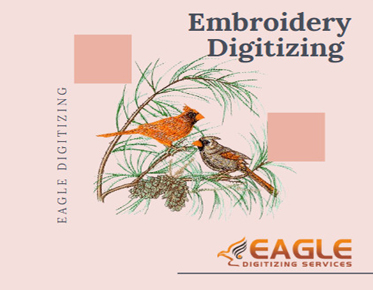How Can Patch Digitizing Transform Apparel and Accessories?
In a world where personalization and uniqueness reign supreme, the art of patch digitizing has emerged as a transformative force in the apparel and accessories industries. From intricate designs to sustainable practices, patch digitizing offers a myriad of benefits that are reshaping the way we think about fashion and design.
Patch digitizing is the meticulous process of converting artwork or designs into digital formats that can be interpreted by embroidery machines. This digital transformation enables the creation of embroidered, woven, or PVC patches with unparalleled precision and detail.
Key Components Involved in Patch Digitizing
- Digitizing Software: At the heart of patch digitizing lies sophisticated digitizing
software. This software acts as the architect, translating complex designs
into digital instructions that guide the embroidery machine in creating
flawless patches.
- Embroidery Machines: State-of-the-art embroidery machines bring digital designs to life
with unparalleled accuracy. These machines meticulously follow the digital
instructions provided by the software, ensuring that every stitch is
placed with meticulous precision.
- Types of Patches: Patch digitizing encompasses a wide range of patch types,
including embroidered, woven, and PVC patches. Each type offers unique
characteristics and visual effects, allowing designers to choose the most
suitable option for their specific needs.
- Material Considerations: Material selection plays a vital role in patch digitizing, influencing the overall quality, durability, and aesthetic appeal of the final product. Factors such as fabric type, thread quality, and backing materials are carefully considered to ensure optimal results.
- Precision and accuracy are paramount in patch digitizing, ensuring
that intricate designs are faithfully reproduced onto fabric or other
materials. Every stitch is meticulously placed according to the digital
instructions, resulting in crisp, clear images and text.
- Reproducibility and consistency are inherent benefits, allowing
for mass production of patches with identical designs and dimensions.
Whether producing a handful of patches or thousands, each one is
meticulously crafted to meet the same high standards of quality and
precision.
- Complex designs and intricate details can be faithfully translated
onto patches, regardless of the level of intricacy. From elaborate logos
to intricate patterns, patch digitizing allows designers to bring their
most ambitious visions to life with stunning clarity and detail.
- Cost-effectiveness and efficiency are achieved through streamlined production processes and reduced labor costs associated with traditional embroidery methods. By automating the digitizing and production process, companies can minimize overhead costs and maximize profitability.
In the apparel industry, patch digitizing finds diverse applications:
- Customized uniforms and workwear benefit from patches that display
company logos or employee names with clarity and precision. Whether
embroidering onto shirts, jackets, or hats, patches add a professional
touch to corporate attire.
- Fashion and streetwear brands utilize patches to add unique
embellishments to garments, enhancing their visual appeal and
marketability. From denim jackets to backpacks, patches offer a versatile
canvas for expressing individual style and personality.
- Sports apparel and team merchandise feature patches showcasing team logos and insignias, fostering a sense of belonging and team spirit among fans. Whether cheering on their favorite team or representing their alma mater, fans proudly display patches on jerseys, hats, and accessories.
In the accessories industry, patches adorn various items:
- Hats and caps become distinctive fashion statements with
embroidered patches, reflecting the wearer's personality and style. From
baseball caps to beanies, patches add a touch of flair and individuality
to headwear.
- Bags and backpacks feature patches that not only add aesthetic
value but also serve as identifiers or promotional tools for brands.
Whether sewn onto a backpack or attached to a messenger bag, patches
provide a unique branding opportunity for companies seeking to stand out
in a crowded market.
- Shoes and footwear are elevated with patches that enhance their visual appeal and branding, appealing to fashion-forward consumers. Whether adorning sneakers, boots, or sandals, patches add a playful twist to footwear, making a bold statement with every step.
- Tailored designs catered to specific brands or individuals,
ensuring that patches accurately reflect desired aesthetics and branding.
Whether creating custom patches for a corporate event or personalized
gifts for friends and family, the possibilities are limitless.
- Incorporation of logos, slogans, and artwork onto patches,
providing endless possibilities for customization and personalization.
From corporate logos to commemorative designs, patches offer a versatile
canvas for expressing creativity and individuality.
- Meeting diverse customer preferences by offering a wide range of design options and customization features. Whether customers prefer classic embroidered patches or modern PVC patches, companies can accommodate a variety of tastes and preferences.
- High-quality stitching and finish ensure that patches withstand
the rigors of everyday wear and tear, maintaining their integrity and
aesthetic appeal over time. Whether sewn onto a jacket or backpack,
patches retain their shape and vibrancy through countless adventures and
wash cycles.
- Long-lasting and resilient patches are achieved through meticulous
attention to detail and the selection of durable materials, guaranteeing
longevity and customer satisfaction. By using high-quality threads and
backing materials, companies can create patches that stand the test of
time, preserving memories and experiences for years to come.
- Suitable for various fabric types and textures, patch digitizing offers versatility and adaptability in application, ensuring compatibility with a wide range of apparel and accessories. Whether embroidering onto cotton, denim, or leather, patches adhere securely to different fabrics, maintaining their appearance and durability under diverse conditions.
- Experimentation with different patch styles and materials allows
for endless creative possibilities, pushing the boundaries of traditional
embroidery techniques. Whether incorporating metallic threads, sequins, or
reflective materials, designers can create patches that captivate the
imagination and inspire awe.
- Integration of technology, such as 3D embroidery, adds depth and
dimension to patches, creating visually striking effects that captivate
consumers. By layering stitches and textures, companies can create patches
that literally stand out from the crowd, making a bold statement with
every stitch.
- Collaborations with artists and designers bring fresh perspectives and innovative designs to patch digitizing, fostering creativity and pushing the industry forward. Whether partnering with local artisans or renowned designers, companies can leverage their expertise to create patches that resonate with consumers on a deeper level, sparking conversations and connections.
- Reduced material wastage is achieved through precise digital
rendering and production, minimizing the need for excess materials and
resources. By optimizing design layouts and minimizing thread usage,
companies can reduce their environmental footprint and contribute to a
more sustainable future.
- Energy-efficient production processes further reduce environmental
impact, promoting sustainable practices and responsible manufacturing.
Whether using energy-efficient machinery or renewable energy sources,
companies can minimize their carbon footprint and conserve natural
resources for future generations.
- Use of eco-friendly materials and practices, such as organic threads and water-based adhesives, minimizes environmental harm and promotes a more sustainable future for the industry. By prioritizing sustainable materials and production methods, companies can reduce pollution and waste, while also meeting the growing demand for eco-friendly products.
Eagle digitizing is emerging as a revolutionary technology in the
apparel and accessories industries, alongside patch digitizing. It
represents a significant paradigm shift in the way designs are created,
applied, and experienced. Both patch digitizing and eagle digitizing
offer remarkable precision and versatility, opening up endless
possibilities for brands, designers, and consumers. They have the
potential for innovation and sustainability, enabling a more sustainable
and creative future. By leveraging the power of these technologies,
companies can provide embroidery patch services and unlock new opportunities for
customization, creativity, and collaboration. This not only enhances the
aesthetic appeal of apparel and accessories but also helps reduce the
environmental footprint, contributing to a brighter, more vibrant world
of fashion and design.



